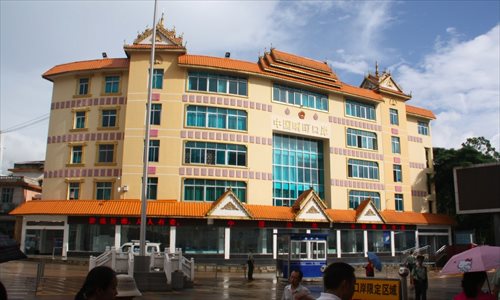
Visitors mill about the Wanding border crossing with Myanmar on August 10 in South China's Yunnan Province. The crossing grows crowded in the winter and spring when Chinese businessmen flock to Myanmar to buy fruits and other produce grown in the Southeast Asian country. (Photo: Zhang Ye/GT)
While some Chinese-invested projects such as the Myitsone hydropower plant and the Letpadaung copper mine have run into barriers in Myanmar, the Southeast Asian country has rolled out the red carpet for Chinese farmers and growers, who are allowed to plant crops in thousands of hectares there. In Southwest China's Yunnan Province, officials from the Dehong Dai and Jingo Autonomous Prefecture, which borders Myanmar, said that central government should take advantage of the ongoing bilateral agriculture cooperation to strengthen its ties with Myanmar's new government, which is already opening up its markets to Japan and the West.
August probably isn't the right time to visit Wanding, a town of Ruili city in Southwest China's Yunnan Province, which sits on the border of Myanmar and the province.
On August 10, stores were seldom open and many of the town's main streets stood deserted. However, it's a different scene in the winter and spring.
From every December to the following April, the 6.7-hectare logistics center for imported goods at the Wanding border crossing will be crowded with thousands of trucks carrying businessmen from all over China, including places as far away as Northwest China's Xinjiang Uyghur Autonomous Region.
The businessmen come to purchase imported fruits from Myanmar, said Yin Zhongde, director of Ruili Key Development and Opening-up Experimental Zone. The zone was established in 2012 to oversee development of the nearby border crossings, including those in Wanding and Jiegao.
In 2015, China imported 660,000 tons of watermelons from Myanmar, the majority of which entered through the frontier city of Ruili, where the Jiegao and Wanding border crossings are located, according to a document from the city's agriculture department.
"China's demand for the Burmese watermelon is expected to keep growing, given the fruit tastes great and costs so little," Duan Xingfa, a businessman in Ruili who has been in the Myanmar watermelon trade since 2011, told the Global Times on August 10.
Watermelons from Myanmar sell for 3,000 yuan ($452) per ton, according to data from Ruili's agricultural department. By comparison, watermelons grown in China cost 5,000 yuan a ton.
Cross-border benefits
Many Chinese fruit growers like Duan have been drawn to the Southeast Asian country. "In 2011, when Myanmar's political situation stabilized, flocks of Chinese growers pushed into the country for its monsoon climate and cheap labor," said Duan.
The cost of growing fruit in Myanmar is 40 percent lower than in China, he noted.
Cross-border planting also benefits people in Myanmar, said Li Zhengfa, head of Ruili agriculture department.
The trade not only channels money to Myanmar, but the Chinese growers also introduce advanced techniques and fertilizers to the local agriculture industry.
During the 1990s, Myanmar farmers worked almost exclusively as laborers on Chinese-invested farms, but lately some have been seeking partnerships with Chinese investors.
Chinese investors have leased 6,667 hectares of land for growing watermelons in Myanmar and secured another 20,000 hectares through partnerships with local farmers, according to the Ruili agriculture department.
Chinese investors are also working with Myanmar farmers to grow rice and corn, raise livestock and open food processing facilities.
Raising livestock is expected to become a big business in Myanmar and Ruili over the next few years because Myanmar will on September 10 resume allowing cattle exports to China, the world's largest meat consumer, via the Ruili border crossing, Li said.
Myanmar suspended cattle exports to China in 2011, citing insufficient supplies for domestic use.
Li also noted that Chinese agribusiness group New Hope has agreed to open a food processing plant in Ruili, to sell products made by cattle imported from Myanmar.


















































